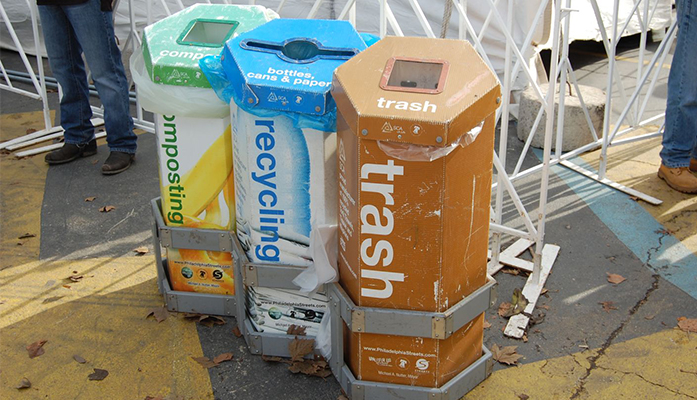
A Penn student teams up with local partners for a cleaner city
How will a bustling, densely-populated city like Philadelphia become 90% zero waste and litter-free by 2035? Little by little, says Haley Jordan (Master of Environmental Science ’18—expected). As Zero Waste and Litter Coordinator for the City of Philadelphia, Haley works with local partners, city building operators, volunteers and other stakeholders to implement a few of the projects planned by the Zero Waste and Litter Cabinet. “Zero waste is a long-term goal,” says Haley. “We’re building out different programs, working on policy issues and trying to look into the future to see how we can make this happen.”
The cabinet’s tactics are varied and broad in scope; Haley’s role includes developing communications to promote sustainable waste management and coordinating audits to reduce and divert waste away from landfills. “The goal is to have the city government lead by example,” she explains. “If we’re asking the whole city to reduce their waste, we need to assess our own.” A waste audit may reveal the need for streamlined recycling processes for certain materials, resources like signage and information on city recycling contracts, or Haley’s own invention—a calculator tool to help municipal building managers keep track of their monthly waste production and identify ways to reduce it—which will be the basis of her final project for her Master of Environmental Studies degree.

In addition to equipping her with knowledge of urban sustainability practices and a refresher on geographic information systems, the Master of Environmental Studies program appealed to Haley because of its breadth and diversity of approaches. “I knew I wanted to live in a city and work in urban sustainability, but my focus was very broad when I arrived at Penn,” Haley recalls. “I've always been kind of a generalist, so I wanted to try a wide range of work and learn about different things. This program definitely allows you to explore.” Haley’s comprehensive educational groundwork, which included classes with Penn Design and Penn Engineering and internship opportunities via Penn Green Campus Partnership, prepared her to meet the diverse challenges in waste reduction.
In the meantime, successes with smaller targets encourage Haley and her colleagues to press forward. This year, more than 20 city events implemented zero waste into their operations by collecting donations and compostable and recyclable waste—and with large-scale zero waste events like the Philadelphia Marathon leading the way, the results add up. Residents and business owners can also reduce or even eliminate waste by composting food or using a garbage disposal, limiting their use of single-use items like to-go packaging and plastic bags, and donating goods like furniture and clothing. “Recycling is important, but it’s just one piece in a larger puzzle,” says Haley. “Reducing waste at its source is really where we are trying to focus. All these small actions add up to make a huge impact.”





